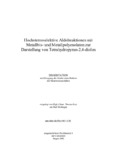Citation link:
https://nbn-resolving.org/urn:nbn:de:hbz:467-138| DC Field | Value | Language |
|---|---|---|
| dc.contributor.author | Koy, Thomas | - |
| dc.date.accessioned | 2019-09-02T09:53:01Z | - |
| dc.date.available | 2005-09-14T12:12:12Z | - |
| dc.date.available | 2019-09-02T09:53:01Z | - |
| dc.date.issued | 2002 | - |
| dc.description.abstract | Es wurden erfolgreich die Metallenolate der Gruppe 13 in der Dominoaldolreaktion zum Aufbau von Tetrahydropyran-2,4-diolen eingesetzt. Dabei wurde eine Reaktionskaskade durchlaufen, bei der 5 stereogene Zentren neu gebildet wurden. Durch die optimale Reaktionsführung wurde lediglich ein einziges Stereoisomer aus 16 möglichen synthetisiert. Auf diesem Wege konnten Alkyl-, Aryl- und Alkoxy-substituierte Tetrahydropyran-2,4-diole hergestellt werden. Es wurde gezeigt, daß innerhalb der Gruppe 13 die Indiumtrisenolate am erfolgreichsten in der Dominoaldolreaktion eingesetzt werden konnten, was auf die physikalischen Eigenschaften wie Ionenradius, Elektronegativität und Ladungsdichte des Indium(III)ions zurückzuführen ist. Aufgrund der erhaltenen Ergebnisse aus der Metall gesteuerten Dominoaldolreaktion konnte ein mechanistisches Modell der Produktbildung erarbeitet werden. Die relative Konfiguration der erhaltenen Produkte konnte in einigen Fällen mittels Röntgenstruktur einwandfrei bestimmt werden, während sonst die relative Konfiguration der Produkte durch NMR-spektroskopische Methoden geklärt wurden. Außerdem wurden erste Vorversuche zur Dominoaldolreaktion über zwei getrennte Metallzentren durchgeführt. | de |
| dc.description.abstract | Enolates of tetrahydropyran-2,4-diols with metals from group XIII were successfully used to catalyse the domino aldol reaction. Further a series of reactions was performed to obtain products containing 5 stereogenic centers. Optimising the reaction conditions enabled isolation of one stereoisomer out of 16 possible isomers. Alkyl-, aryl- and alkoxy substituted tetrahydropyran-2,4-diols were thus synthesised by the above mentioned strategy. Among the group XIII metal enolates used indium tris enolate was found to be most effective. This is due to various physical characteristics such as ion radius, electronegativity and charge density of the indium(III)ions. A mechanistic model for the metal controlled domino aldol reaction was deduced from the results obtained. The relative configuration of all the products was assigned by NMR and in few cases by x-ray crystallography. Additionally first preliminary tests for domino aldol reaction over two localseparated metal centers were performed. | en |
| dc.identifier.uri | https://dspace.ub.uni-siegen.de/handle/ubsi/863 | - |
| dc.identifier.urn | urn:nbn:de:hbz:467-138 | - |
| dc.language.iso | de | de |
| dc.rights.uri | https://dspace.ub.uni-siegen.de/static/license.txt | de |
| dc.subject.ddc | 540 Chemie | de |
| dc.subject.other | Metallenolat | de |
| dc.subject.other | Dominoaldolreaktion | de |
| dc.subject.other | Indiumtrisenolat | de |
| dc.title | Hochstereoselektive Aldolreaktionen mit Metallbis- und Metallpolyenolaten zur Darstellung von Tetrahydropyran-2,4-diolen | de |
| dc.type | Doctoral Thesis | de |
| item.fulltext | With Fulltext | - |
| ubsi.date.accepted | 2002-10-10 | - |
| ubsi.publication.affiliation | Fachbereich 8, Chemie - Biologie | de |
| ubsi.subject.ghbs | UZS | - |
| ubsi.type.version | publishedVersion | de |
| Appears in Collections: | Hochschulschriften | |
This item is protected by original copyright |
Page view(s)
440
checked on Dec 1, 2024
Download(s)
140
checked on Dec 1, 2024
Google ScholarTM
Check
Items in DSpace are protected by copyright, with all rights reserved, unless otherwise indicated.


